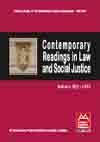ASSISTED SUICIDE – BETWEEN THE RIGHT TO LIFE, THE OBLIGATION TO LIVE AND SOCIAL ACCEPTANCE
ASSISTED SUICIDE – BETWEEN THE RIGHT TO LIFE, THE OBLIGATION TO LIVE AND SOCIAL ACCEPTANCE
Author(s): Wedad Quffa, Dan-Valeriu VoineaSubject(s): Law, Constitution, Jurisprudence
Published by: Addleton Academic Publishers
Keywords: right to life; assisted suicide; euthanasia; Christianity
Summary/Abstract: Random House Webster’s dictionary gives two definitions to the term euthanasia: “Mercy killing”, the act or practice of killing or permitting the death of hopelessly sick or injured individuals (as persons or domestic animals) in a relatively painless way for reasons of mercy. “An easy or painless death”. The Romanian code of medical ethics from 2005 “absolutely prohibits euthanasia or use of substances or means to cause death to a patient, regardless of the severity and prognosis, even if urged by a fully conscious patient.” The idea of euthanasia is not recent, and neither is its dismissal - the Hippocratic Oath says: “I will give no deadly medicine to any one if asked, nor suggest any such counsel;” There are countries in Europe that approve these procedures when performed in specialized clinics or at the home of the patient (Switzerland, Netherlands), states that support assisted suicide in extreme cases or grant mitigating circumstances (France, Germany) and countries that categorically reject the idea (Romania, UK or Wales). What is euthanasia or assisted suicide: a blessing not yet accepted by society or a curse too often allowed by law?
Journal: Contemporary Readings in Law and Social Justice
- Issue Year: V/2013
- Issue No: 2
- Page Range: 261-266
- Page Count: 6
- Language: English
- Content File-PDF

